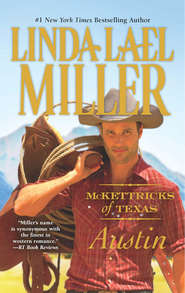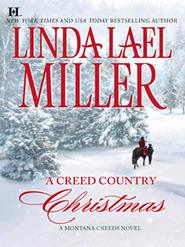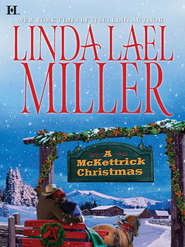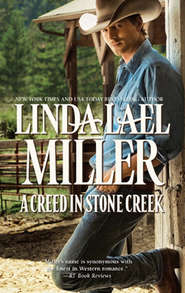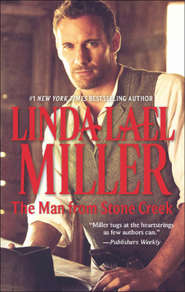По всем вопросам обращайтесь на: info@litportal.ru
(©) 2003-2024.
✖
The Christmas Brides: A McKettrick Christmas
Автор
Год написания книги
2019
Настройки чтения
Размер шрифта
Высота строк
Поля
LIZZIE MCKETTRICK LEANED SLIGHTLY forward in her seat, as if to do so would make the train go faster. Home. She was going home, at long last, to the Triple M Ranch, to her large, rowdy family. After more than two years away, first attending Miss Ridgely’s Institute of Deportment and Refinement for Young Women, then normal school, Lizzie was returning to the place and the people she loved—for good. She would arrive a day before she was expected, too, and surprise them all—her papa, her stepmother, Lorelei, her little brothers, John Henry, Gabriel, and Doss. She had presents for everyone, most sent ahead from San Francisco weeks ago, but a few especially precious ones secreted away in one of her three huge travel trunks.
Only her grandfather, Angus McKettrick, the patriarch of the sprawling clan, knew she’d be there that very evening. He’d be waiting, Lizzie thought happily, at the small train station in Indian Rock, probably at the reins of one of the big flat-bed sleighs used to carry feed to snowbound cattle on the range. She’d warned him, in her most recent letter, that she’d be bringing all her belongings with her, for this homecoming was permanent—not just a brief visit, like the last couple of Christmases.
Lizzie smiled a mischievous little smile. Even Angus, her closest confidant except for her parents, didn’t know all the facts.
She glanced sideways at Whitley Carson, slumped against the sooty window in the seat next to hers, huddled under a blanket, sound asleep. His breath fogged the glass, and every so often, he stirred fitfully, grumbled something.
Alas, for all his sundry charms, Whitley was not an enthusiastic traveler. His complaints, over the three days since they’d boarded the first train in San Francisco, had been numerous.
The train was filthy.
There was no dining car.
The cigar smoke roiling overhead made him cough.
He was never going to be warm again.
And what in God’s green earth had possessed the woman three rows behind them to undertake a journey of any significant distance with two rascally children and a fussy infant in tow?
Now the baby let out a pitiable squall.
Lizzie, used to babies because there were so many on the Triple M, was unruffled. Whitley’s obvious annoyance troubled her. Although she planned to teach, married or not, she hoped for a houseful of children of her own someday—healthy, noisy, rambunctious ones, raised to be confident adults and freethinkers.
It was hard, in the moment, to square the Whitley she was seeing now with the kind of father she had hoped he would be.
The man across the aisle from her laid down his newspaper, stood and stretched. He’d boarded the train several hours earlier, in Phoenix, carrying what looked like a doctor’s bag, its leather sides cracked and scratched. His waistcoat was clean but threadbare, and he wore neither a hat nor a sidearm—the absence of both unusual in the still-wild Arizona Territory.
Although Lizzie expected Whitley to propose marriage once they were home with her family, she’d been stealing glances at the stranger ever since he entered the railroad car. There was something about him, beyond his patrician good looks, that constantly drew her attention.
His hair was dark, and rather too long, his eyes brown and intense, bespeaking formidable intelligence. Although he probably wasn’t a great deal older than Lizzie, who would turn twenty on her next birthday, there was a maturity in his manner and countenance that intrigued her. It was as though he’d lived many other lives, in other times and places, and extracted wisdom from them all.
She heard him speak quietly to the harried mother, turned and felt a peculiar little clench in the secret regions of her heart when she saw him holding the child, bundled in a shabby patchwork quilt coming apart at the seams.
Whitley slumbered on, oblivious.
There were few other passengers in the car. A wan and painfully thin soldier in a blue army uniform, recuperating from some dire illness or injury, by the looks of him. A portly salesman who held what must have been his sample case on his lap, one hand clasping the handle, the other a smoldering cigar. He seemed to have an inexhaustible supply of the things, and he’d been puffing on them right along. An older couple, gray-haired and companionable, though they seldom spoke, accompanied by an exotic white bird in a splendid brass cage. Glorious blue feathers adorned its head, and when the cage wasn’t covered in its red velvet drape, the bird chattered.
All of them, except for Whitley, of course, were strangers. And seeing Whitley in this new and disconcerting light made him seem like a stranger, too.
A fresh wave of homesickness washed over Lizzie. She longed to be among people she knew. Lorelei, her stepmother, would be baking incessantly these days, hiding packages and keeping secrets. Her father, Holt, would be locked away in his wood shop between ranch chores, building sleds and toy buckboards and dollhouses, some of which would be gifts to Lizzie’s brothers and various cousins, though the majority were sure to find their way onto some of the poorer homesteads surrounding the Triple M.
There were always a lot of presents tucked into the branches of the family’s tree and piled beneath it, and an abundance of savory food, too, but a McKettrick Christmas centered on giving to folks who didn’t have so much. Lorelei, Lizzie herself, and all the aunts made rag dolls and cloth animals with stuffing inside, to be distributed at the community celebration at the church on Christmas Eve.
The stranger walked the aisle with the baby, bringing Lizzie’s mind back to the here and now. He glanced down into her upturned face as he passed. He didn’t actually smile—as little as she knew about him, she had figured out that he was both solemn and taciturn by nature—but something moved in his eyes.
Lizzie felt a flash of shame. She should have offered to spell the anxious mother three rows back. Already the child was settling down a little, cooing and drooling on the man’s once-white shirt. If he minded that, he gave no indication of it.
Beyond the train windows, heavy flakes of snow swirled in the gathering twilight, and while Lizzie willed the train to pick up speed, it seemed to be slowing down instead.
She was just about to speak to the man, reach out for the baby, when a horrific roar, like a thousand separate thunderheads suddenly clashing together, erupted from every direction and from no direction at all. The car jerked violently, stopped with a shudder fit to fling the entire train off the tracks, tilted wildly to one side, then came right again with a sickening jolt.
The bird squawked in terror, wings making a frantic slapping sound.
Lizzie, nearly thrown from her seat, felt the clasp of a firm hand on her shoulder, looked up to see the stranger, still upright, the baby safe in the curve of his right arm. He’d managed somehow to stay on his feet, retain his hold on the child and keep Lizzie from slamming into the seat in front of her.
“Wh-what…?” she murmured, bewildered by shock.
“An avalanche, probably,” the man replied calmly, as though a massive snowslide was no more than he would have expected of a train ride through the rugged high country of the northern Arizona Territory.
Whitley, shaken awake, was as frightened as the bird. “Are we derailed?” he demanded.
The stranger ignored him. “Is anyone hurt?” he asked, of the company in general, patting the baby’s back and bouncing it a little against his shoulder.
“My arm,” the woman in back whimpered. “My arm—”
“Nobody panic,” the man in the aisle said, shoving the baby into Lizzie’s arms and turning to take the medical kit from the rack above his seat. He spoke quietly to the elderly couple; Lizzie saw them nod their heads. They were all right, then.
“Nobody panic!” the bird cawed. “Nobody panic!”
Despite the gravity of the situation, Lizzie had to smile at that.
Whitley rubbed his neck, eyeing the medical bag, after tossing a brief, disgruntled glare at the bird. “I think I’m hurt,” he said. “You’re a doctor, aren’t you? I need laudanum.”
“Laudanum!” the bird demanded.
“Hush, Woodrow,” the old lady said. Her husband put the velvet drapery in place, covering the cage, and Woodrow quieted instantly.
The doctor’s answer to Whitley was a clipped nod and, “Yes, I’m a physician. My name is Morgan Shane. I’ll look you over once I’ve seen to Mrs. Halifax’s arm.”
The baby began to shriek in Lizzie’s embrace, straining for its mother.
“Make him shut up,” Whitley said. “I’m in pain.”
“Shut up!” Woodrow mimicked, his call muted by the drapery. “I’m in pain!”
Lizzie paid Whitley no mind, got to her feet. “Dr. Shane?”
He was crouched in the aisle now, next to the baby’s mother, gently examining her right arm. “Yes?” he said, a little snappishly, not looking away from what he was doing. The older children, a boy and a girl, huddled together in the inside seat, clinging to each other.
“The baby—the way he’s crying—do you think he could be injured?”
“My baby is a girl,” the woman said, between groans.
“She’s just had a bad scare,” Dr. Shane told Lizzie, speaking more charitably this time. “Like the rest of us.”
“I think we’s buried,” the soldier exclaimed.
“Buried!” Woodrow agreed, with a rustle of feathers.






